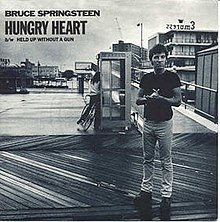
About the song
“Hungry Heart” by Bruce Springsteen is one of the most iconic songs in his extensive catalog, and it holds a special place in the hearts of fans worldwide. Released on September 13, 1980, as the lead single from his album “The River,” the song marks a pivotal moment in Springsteen’s career, bridging the gap between his earlier, more introspective work and his growing mainstream success. Known for his ability to blend deeply personal storytelling with universal themes, “Hungry Heart” became one of Springsteen’s most commercially successful songs, reaching #5 on the Billboard Hot 100 and becoming a staple of his live performances.
The song’s lyrics are a study in contrast: the narrator’s deep emotional yearning for connection and the contrasting reality of his inner turmoil. “Hungry Heart” tells the story of a man who feels a powerful, unfulfilled longing—a hunger for something more in his life. The song is widely interpreted as a reflection on the struggles of everyday life, the search for meaning, and the disappointment that often comes with the pursuit of dreams. The phrase “hungry heart” can be seen as both a metaphor for emotional emptiness and an expression of the drive to overcome personal obstacles. The character in the song leaves his past behind in search of something better, but finds himself still caught in a cycle of longing and dissatisfaction.
Musically, “Hungry Heart” marks a departure from some of the more gritty, blue-collar anthems that defined Springsteen’s early sound. With its upbeat, almost pop-like energy, it introduced a more accessible, radio-friendly side of Bruce Springsteen that was embraced by a wider audience. The song’s catchy melody and sing-along chorus were in stark contrast to the more somber, reflective tone of much of “The River” album. This juxtaposition of upbeat instrumentation with introspective, poignant lyrics is one of the reasons the song has such broad appeal, resonating with both casual listeners and diehard fans alike.
“Hungry Heart” is also significant in the context of Springsteen’s social commentary. The song captures a moment in time when many Americans were grappling with feelings of disillusionment and uncertainty, particularly in the wake of the 1970s economic downturn. The song’s themes of longing, desire, and the search for meaning in a world that often feels unsatisfactory resonated with a wide swath of listeners, and it encapsulated the era’s sense of hope and despair. At a time when the United States was experiencing both a shift in political power and an economic recession, Springsteen’s lyrics struck a chord with listeners who identified with the struggles and aspirations of the working class.
“Hungry Heart” also represents a moment of evolution in Springsteen’s career. While he had already established himself as a writer of deeply personal, poetic songs about American life, this song marked a shift toward a more universally relatable sound—one that had the potential to cross over into the mainstream. The album “The River”, which includes “Hungry Heart,” showcases Springsteen’s musical diversity, moving from the raw, soul-searching ballads to more anthemic, rock-infused tunes. The song’s success marked Springsteen’s first major radio hit, proving that his storytelling abilities could capture the imagination of a much broader audience.
The song’s legacy has only grown over time. In addition to being a fan favorite at Springsteen’s live shows, “Hungry Heart” has been credited with helping to elevate Springsteen’s career to new heights, setting the stage for the massive success of subsequent albums like “Born in the U.S.A.” The song’s chorus is instantly recognizable, and its emotional depth remains timeless. It’s a perfect example of Springsteen’s skill at blending personal vulnerability with broader social themes, and of his ability to craft songs that speak to the human condition.
In conclusion, “Hungry Heart” is not just a song about emotional yearning; it is a snapshot of a moment in time that resonated with millions. From its upbeat, infectious sound to its insightful exploration of the complexities of the human experience, it stands as one of Bruce Springsteen’s most memorable tracks. Released during a period of both personal and social transformation, the song has continued to serve as a touchstone for fans and newcomers alike, capturing the essence of the American experience with honesty, heart, and timeless appeal.
Video
Lyrics
Got a wife and kids in Baltimore, JackI went out for a ride and I never went backLike a river that don’t know where it’s flowingI took a wrong turn and I just kept goingEverybody’s got a hungry heartEverybody’s got a hungry heartLay down your money and you play your partEverybody’s got a h-h-hungry heartOhI met her in a Kingstown barWe fell in love, I knew it had to endWe took what we had and we ripped it apartNow here I am down in Kingstown againEverybody’s got a hungry heartEverybody’s got a hungry heartLay down your money and you play your partEverybody’s got a h-h-hungry heartLa-la-la-la-la-la, oh yeahLa-la-la-la-la-laEverybody needs a place to restEverybody wants to have a homeDon’t make no difference what nobody saysAin’t nobody like to be aloneEverybody’s got a hungry heartEverybody’s got a hungry heartLay down your money and you play your partEverybody’s got a h-h-hungry heartOh yeah(Everybody’s got a hungry heart)(Lay down your money and you play your part)Oh yeah(Everybody’s got a hungry heart)La-la-la-la-la-laOoh yeahLa-la-la-la-la-la